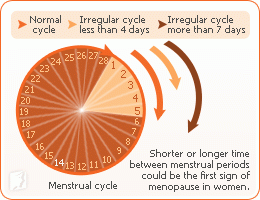Most women are likely to suffer menstrual irregularities at some point during their reproductive lifetime, and as a result of several factors such as puberty, pregnancy, stress, diet, and menopause. They are most often caused by a hormonal imbalance. However, there are many options women have that can help them regulate their periods.
What Are Irregular Periods?

Every woman has her own period pattern.All women's cycles are different, so only you can tell if there is any irregularity with yours. Irregular periods are usually identified by changes in the pattern of menstrual bleeding like the length between periods, the duration, and the flow. Typically, every woman has her own period pattern and she knows approximately the time each month when her period should start. Women are considered regular if their periods occur around the same date each month. However, with age, the frequency of periods can fluctuate, leaving women confused about when their next period will be.
What Causes Irregular Periods?
Women's irregular periods can be caused by various factors such stress, fatigue, diet, and weight gain or loss. However, menopause is the most common trigger of irregular periods in middle-aged women. Menopausal women are at a point in which they will slowly stop menstruating until ovulation has ceased and they have become infertile. During this time, periods are infrequent and irregular.
In females, the hormones estrogen and progesterone are responsible for controlling the menstrual cycle, and when they become imbalanced, it can result in irregular periods in women. It's possible that leading up to menopause, a woman will produce too much estrogen or progesterone, and this puts hormones out of sync.Irregular periods are just one of the many symptoms that can result from a hormonal imbalance during menopause.Read on to learn about unusual symptoms that may necessitate a visit to your doctor.
Common Symptoms of Irregular Periods

The most frequent menstrual irregularity symptoms include:
- Longer or shorter periods
- Painful cramps
- Abnormal duration of bleeding
- Blood clots
- Heavier or lighter blood flow
- Breast tenderness
- Fluid retention
- Headaches
- Early or late periods
- Missed period
Keep reading to learn about the triggers of women's irregular periods.
Symptoms That Require Medical Attention
If you think you have irregular periods, check to see if you have any of the following symptoms. If so, you may want to consult your doctor.
- Spotting or bleeding in between periods
- Spotting or bleeding after sex
- Periods that occur more than every three weeks
- Excessive bleeding
Irregular periods during menopause can be managed. Explore the articles below to learn more about irregular period treatments.
Sources
- Hutchinson, Susan M.D. "The Stages of a Woman's Life: Menstruation, Pregnancy, Nursing, Perimenopause, Menopause". November 2007.
- Love, Susan M.D. Menopause and Hormone Book. New York: Three Rivers Press, 2003.
- BMJ Group. "Menopause: What is it?" Patient Leaflet. 2007



